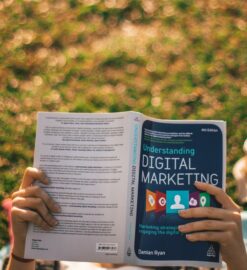“The Age of AI: And Our Human Future” | review + learn

The Age of AI book may be of value to you if you want to learn about artificial intelligence both in the past and how it may impact the future. Learn about the book here and if it’s right for you.
SnapShot
Date Published: October 19, 2021
Authors: Daniel P. Huttenlocher, Eric Schmidt, & Henry Kissinger
Genre: Non-fiction, science
Accessibility: Amazon, Barnes and Noble (where I first discovered it)
What: All about artificial intelligence: past, present, and future – advancements, issues, and potential
The irony is that even as digitization is making an increasing amount of information available, it is diminishing the space required for deep, concentrated thought.
The Age of AI: And Our Human Future
Interested in more ethical aspects of technology? Check out
Concepts the Book is Filled with
- Pondering Questions
- History: both societal and scientific
- Political aspects
- Future predictions and impacts of AI
- The relationship between humans and AI
- The impact of internet platforms
Some Concepts Mentioned + Learned
Some AI Terminology
- “AI Winter”: a period from the late 1980s-1990s where machines failed the Turing test
- Turing test: determines if a machine acts like a human
- Neural networks: a method inspired by our brains to teach AI data
- Different learning styles: supervised learning, unsupervised learning, and reinforcement learning
- Transformers: can process language from any direction
- Generative AI: can create new images, text, and sounds
- Generative adversarial networks (GANs): training technique for generative AIs
- Underspecification
- Rigidity: misidentification from unforeseen errors
- Positive network effect: the more users the more desirable and valuable the network platform becomes
- Automatic and semiautomatic AI weapons
- AI-piloted fighter jets
- Nuclear deterrence: threats using weapons as a counteraction
- Mutual assured destructions (MAD): a deterrence theory
- Arms control: restricting weapons to prevent nuclear war
- Non-proliferation: nuclear weapons and their information should not leave their country
- Central paradox*
- “Physicalists” and “virtualists“
- AI assistants: ex. Alexa, Google Home, etc.
- Deep fakes: a form of misinformation in AI
Historical Science Breakthroughs
- AlphaZero: chess breakthrough
- AlphaFold: reinforcement learning used for new proteins
Some Applications
- tour guide
- car
- travel
- weaponry
- biology
- digital assistants
Networks Platforms
- real-life applications of AI
- google translate
- search engines
- online streaming
- browsing feed
- important to know
- trust
- relying on them
- political influence
- potential policies
- international effect
Government & Politics
- potential policies
- AI-facilitated war
- weaponizing AI: cyber weapons, nuclear weapons, etc.
- prohibition
- cyber conflicts
- democracy
- pass us & expand us
- AI ethics
Relationship
- potential collaboration
- decisions
- new partnerships
- differences: can’t reflect or explain its reasoning
- new generations
- knowing reality
Important Messages
- acknowledging change & participation
- human-machine dialogue / essential dialogue needed
- domestic regulation
- learning from history
- no one understands everything about AI
- progression on questions
5 Facts that Weighed Heavy
“That current human-machine partnership requires both a definable problem and a measurable goal is reason not to fear all-knowing, all-controlling machines; such inventions remain the stuff of science fiction.”
When you search for something on Google, for instance, the items appearing aren’t the “initial range of possibilities” since it’s biased based on previous searches.
Network Platforms are so powerful they’re viewed as a form of international strategy.
*Central Paradox: “the greater a society’s digital capacity, the more vulnerable it becomes.”
“Just as a divide exists today between “digital natives” and prior generations, so too, will a divide emerge between “AI natives” and the people who proceed them.”

Who Should Read The Age of AI?
If you want an overview of artificial intelligence covering many aspects from the past, politics, and its potential. There are sections of the book that cover a lot about history, network platforms, and relationships with AI. If certain concepts don’t interest you, you can eiher skip sections or hold off on the book.
If you want to ponder about some topics revolving around AI both ethical and futuristic this could be for you.
Do you read/watch content on AI that may not be credible? Then you could learn about AI from credible sources through this book.
This book is does read in relativly high language, so it’s better suited for individuals wanting to read intellectual books. If you take the time to annote and process though, you can adapt to the language of the book even if you’re not usually used to the writing style.
3 Things I Like
- The variety of aspects and perspectives touched upon – history, science, government, civilians, social media, etc.
- Not only teaching us about the potential future of AI, but also taking the time to teach the technical aspects of AI that are beneficial to know – generative AI, neural networks, underspecification, etc.
- The real-life applications mentioned (which make it more understandable) such as Google Search Engine, Facebook, and examples involving cars, travel, games, and more.
- Extra: how reliable the sources are.
3 Things I Dislike
- There is a certain level of repetetiveness. Sometimes the same thing is said in a different way all throughout the book in relation to how careful we should be about AI and its impact on us
- How much of the content that’s dedicated to politics.
- The need for constantly sounding very highly.
Adjectives Describing The Age of AI
Futuristic, inquisitive, educational, scientific, historical, political, complex and broad at the same time




Mark
Thanks for your blog, nice to read. Do not stop.